Exclusive Interview|Li Xincao, Creator of the Multimedia Choral Drama "Songs of Nie Er": Singing Nie Er Through His Own Music
On July 16th, Li Xincao, President of the China Conservatory of Music and a distinguished guest at the 8th Nie Er Music Week, embarked on a journey blending ecological observation and nostalgic remembrance, visiting Dianchi Wetland and Dounan Flower Market.
Appreciating Dianchi's Scenery, Revisiting Childhood Memories
Around 10:30 AM, Li Xincao and his delegation arrived at Baofeng Wetland. Accompanied by a guide, they learned about the wetland's plant communities, strolled along winding forest boardwalks, and admired the magnificent scenery of the immersed forest.
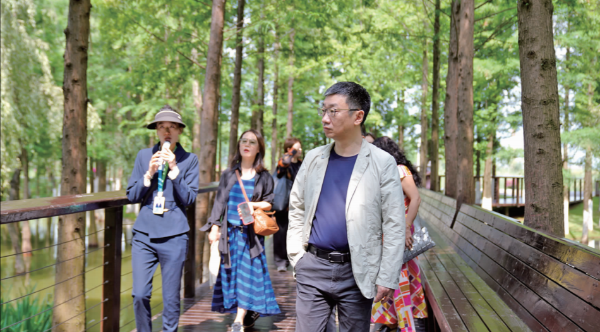
Li Xincao and his delegation walking along the winding forest boardwalk.
Reaching the observation platform, the group took in the vista of Dianchi Lake reaching out as far as the eye could see. The view perfectly aligned with the iconic Daguan Pavilion couplet, "Five hundred li of Dianchi rush into view; Unbuttoning my coat and doffing my hat, I rejoice in the boundless open space." Li Xincao expressed his emotions, stating, "This is the first time I've seen Dianchi with such clear waters from this angle. After the restoration efforts, the clear waters of Dianchi are back."
"I remember Dianchi's ecosystem being very healthy when I was a child. If it rained heavily one day, the next day, when the sun came out, many choked crucian carp would appear, and it was a good time to catch fish. In my childhood, I often caught fish in Dianchi near Haigeng Park with my friends," Li Xincao excitedly recounted his childhood memories of Dianchi.
"I am very proud of my hometown!" he exclaimed. "This landscape is an invaluable treasure bestowed upon us by nature, and we must protect it well, so that more people know and see it." His words were filled with both satisfaction regarding the ecological changes of his homeland and a firm determination to protect its future.
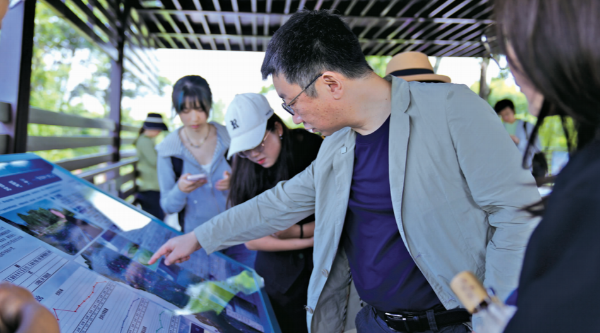
Li Xincao learning about Dianchi's conservation.
In addition to Baofeng Wetland, Li Xincao's group also traveled along the scenic Dianchi Greenway by sightseeing bus to Wangguan and Dounan Wetlands, experiencing the unique beauty of Dianchi from various perspectives. Along the way, Li Xincao expressed his admiration for Dianchi's beauty, frequently taking out his phone to capture the stunning scenery.
Invite Violin Students to Watch "Songs of Nie Er"
As Li Xincao and his group walked through a lawn in Baofeng Wetland, they heard the sound of violins. Following the sound, they found several primary school students practicing the violin. "Seeing them reminds me of when we were kids, we also often practiced outside," Li Xincao said, as he walked towards the young violinists and warmly interacted with them.
"Which school are you from?" "What piece are you practicing?" "How long have you been learning the violin?" The students answered Li Xincao's questions. When he learned that the students were from Changchun Primary School, Nie Er's alma mater, Li Xincao said with great interest, "Let me test you."
"Do you know when Nie Er was born and when he passed away?" After receiving affirmative answers from the students, Li Xincao said to the children, "Did you know that July 17th of this year is the 90th anniversary of Nie Er's passing? During the Nie Er Music Week activities, the choral drama 'Songs of Nie Er,' which I created, will also premiere. You are welcome to come and watch."
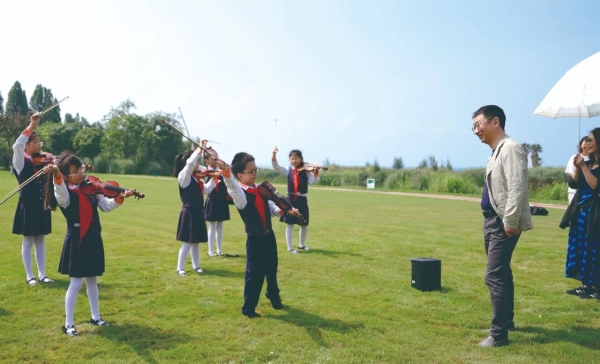
July 16, Baofeng Wetland, children from the Changchun Primary School Violin Ensemble playing "Song of Newsboy".
The primary school students then performed "Song of Newsboy" for Li Xincao. "Fantastic!" After the performance, Li Xincao kindly encouraged the students, "I hope you practice hard. Next time, I want to hear you play more of Nie Er's music!"
When they learned that the person they interacted with was the President of the China Conservatory of Music, the students became excited and eagerly took photos with Li Xincao. Zeng Zhihao, who is in the second grade, said that he has been learning in the Changchun Primary School Violin Ensemble for more than two years and has a passion for the violin. "Today, I am very happy to receive guidance from Mr. Li Xincao. I will definitely go to see 'Songs of Nie Er' during the Nie Er Music Week activities."
Visiting Dounan Flower Market, Experiencing Flower Auctions
Afterward, Li Xincao visited the largest fresh-cut flower trading market in Asia, Dounan Flower Market.
Wearing floral wreaths, Li Xincao and his delegation were surrounded by a sea of vibrant colors and fragrant aromas upon entering the market. Through the staff's introduction, Li Xincao and his delegation learned about Dounan Flower Market's history from its beginning as a "roadside market", to its current status as the "Flower Capital of Asia". Every transformation embodied the efforts and wisdom of the flower farmers and workers.
Subsequently, guided by the staff, Li Xincao and his group walked into the YUN HUA FLORABID Flower Tourism Center on the second floor of Hall 4 of the Dounan Flower Market. Here, the auction model of the Dounan large-scale fresh flower trading center is replicated 1:1. It is the first cultural tourism experience project in China that features "B2C smart fresh flower retail auction." It can be easily operated through a mobile app.
Under the guidance of the staff, Li Xincao and his delegation were immersed in the flower descending price-auction experience. They first familiarized themselves with the auction process in the simulation hall, and then eagerly entered the auction hall to participate in the official auction. The hands of the transaction clock turned counterclockwise, and the price gradually decreased from a high point. Participants stared at the clock and decisively bid at the appropriate time, successfully bidding for the flowers.
"Kunming, the Spring City, the Flower Capital of Asia, beautiful!" After the immersive descending-price flower auction experience, Li Xincao and the staff shouted slogans together to support Kunming's flower economy industry.
At the end of the vist, Li Xincao and his delegation ended their ecological and cultural journey with a unique Yunnan "flower feast" at the Shangyunduan Restaurant on the fifth floor of the flower market.
Exclusive Interview
On July 17th, "Songs of Nie Er," a large-scale multimedia choral drama carrying the spiritual heritage of musician, Nie Er, will be staged at the Yunnan Grand Theater. This opening performance produced by the China Conservatory of Music, coordinated and produced by the Art Practice Center of the China Conservatory of Music, and performed by the China Conservatory of Music, the Kunming Nie Er Symphony Orchestra, Kunming Ethnic Song and Dance Theater Co., Ltd., and the Kunming City College Boya Voice Choir will use innovation to reinterpret Nie Er's brilliant and short life, whilst performing a deep memorial that transcends time in Yunnan.
How was "Songs of Nie Er" created? What is its significance to this Era? How can we better inherit and develop Nie Er's works? On July 16th, with these questions, a reporter from the Dushi Shibao interviewed the creator of the drama, Li Xincao, President of the China Conservatory of Music.
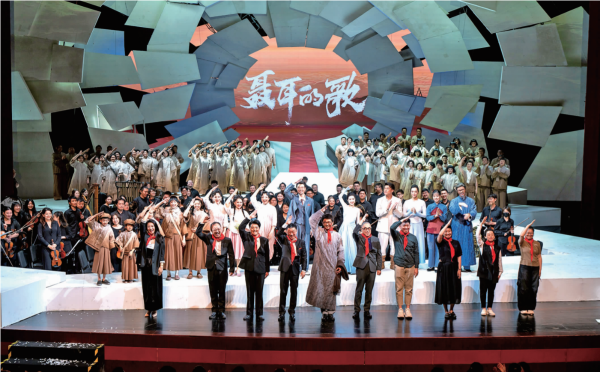
Performance photo of "Songs of Nie Er," photo from the Kunming Nie Er Symphony Orchestra.
"Songs of Nie Er"
Inspiration to Composition Born from a Field Research Trip
Li Xincao introduced the origins of the drama. In 2023, at the invitation of the Yuxi Municipal Party Committee and the Municipal Government, he embarked on a field research trip to Yuxi. Yu Hai, who proposed the National Anthem Law, suggested that he hoped to create some artistic works that reflect Nie Er's life, especially to make his works more widely sung.
"Nie Er was a prolific composer, and the peak of his composition focused on the last two or three years of his life, leaving behind forty to fifty classic songs." Li Xincao emphasized, "A musician like Nie Er, who had not received systematic professional training and had not created much in the early days, could create such a large number of works with a high degree of political significance in just three to five years. Deserves to be a musical master of a century." However, he pointed out that although there are many of Nie Er's works, less than 10 are well known.
How to make more people know and sing Nie Er's songs? Li Xincao believes that among the many forms of singing, chorus is the most easily accepted by the public. "The idea of 'choral drama' flashed in my mind at that time." He introduced, "Although there may have been similar forms before, it was not clearly named 'choral drama'. We finally decided to present it in this innovative form."
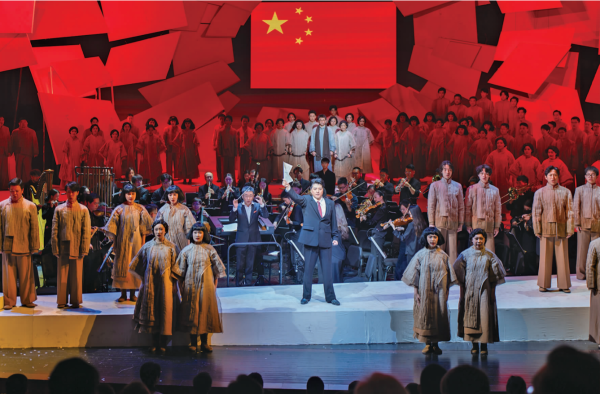
Performance photo of "Songs of Nie Er," photo from the Kunming Nie Er Symphony Orchestra.
"The significance of "Songs of Nie Er" lies in: using Nie Er's works from his lifetime as musical material, using the musician's own music to commemorate the musician, and using Nie Er's songs to sing about Nie Er." Li Xincao explained the core concept of the drama. The work takes the life trajectory of the musician as a framework, vividly outlining the magnificent artistic and faith intertwined picture. From the spark of inspiration at Kunming's Cuihu that birthed "Spring Dawn on the Green Lake", to the shouts for the working masses in Shanghai streets with "Song of Newsboy" and "Song of the Broad Road". The drama also focuses on the eternal moment in 1935. Nie Er requested to compose music for Tian Han's poems, which sublimated the last sentence of the original words to "Brave the enemy's gunfire! Forward! Forward! Forward! On!" — a thunderous melody that erupted with revolutionary fervor. Through multimedia technology, the drama resurrects historical scenes, reigniting Nie Er's twenty-four years of blazing life in a symphony of light, shadow, and musical notes.
Nie Er's Works
Classics Demand Reinvention to Sustain Their Eternal Radiance
Talking about the eternal value of Nie Er's works, Li Xincao analyzed, "The reason why classics are classics lies in the quality of the art itself. Nie Er's works were born in a special historical period and have extremely high historical value."
"Now, although the era of war has passed and we have ushered in an era of peace and prosperity, singing about those classic works born in the smoke of war also has the value of era. I believe that in the future, these works will create higher future value. Classics need to be constantly performed and sung to allow more people to hear and inherit them," said Li Xincao.
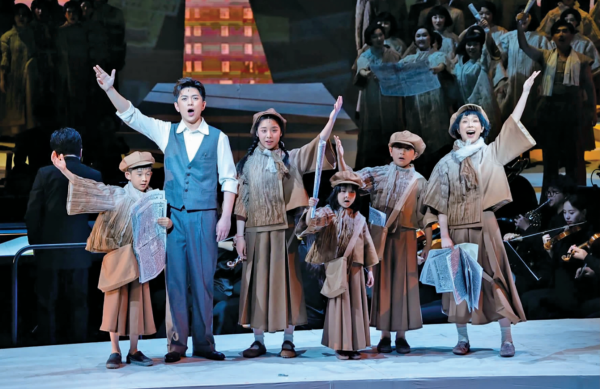
Performance photo of "Songs of Nie Er," photo from the Kunming Nie Er Symphony Orchestra.
At the same time, he also emphasized the need for innovation: "Nie Er's works were born in a difficult era, and the size and instrument configuration of the orchestra at that time cannot be compared with today. If the performance form at that time is repeated, it will be difficult to adapt to modern promotion needs. Therefore, we need to improve the artistry of these works. Improve the form of communication, make them more suitable for modern people to appreciate, and make contemporary people like to listen and want to watch." He pointed out, "Classic works require contemporary reinvention (reinterpretation) to maintain their timeless brilliance. Each era demands fresh approaches, but we must adhere to principles while innovating."
Kunming Memories
"The 5 Years spent in Kunming were the Golden Age of My Life."
As a native of Baoshan, Yunnan, Li Xincao spent his formative years from age 12 to 17 in Kunming. These five years left a special imprint on his heart. "If I were to speak of the most blossoming period of my life, it would undoubtedly be my school days in Kunming," Li Xincao fondly recalled. Dongfeng Square, the Worker's Cultural Palace, and Xiaoximen were all places he often visited at that time.
"Although conditions were tough and education was relatively backward at the time, I could practice the piano here without being disturbed." He admitted, "I dare not say how much I improved in professional skills during that time, but it provided me with the spiritual pillar to continue on my artistic path. Therefore, I want to thank that era and that land of Kunming for nourishing my musical soul."